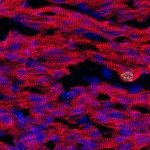Lien vers Pubmed [PMID] – 25286050
Wiley Interdiscip Rev Syst Biol Med 2014 Nov-Dec;6(6):389-97
Insights into the mechanisms of development of the mammalian four-chambered heart are based on biological observations at organ, tissue, cell, and molecular levels, but the full integration of these experimental data awaits a systems biology approach. Such an approach can be employed to formulate and test conceptual models in a computational simulation. To illustrate how this can be applied to heart development, we used the process of trabeculation, which is the formation of muscular strands during chamber development. We selected this process because it is localized, involves a restricted number of cell types, and a range of experimental data is available. Trabeculation of the ventricles is based on the interplay between endocardial and myocardial cells and involves molecular pathways underlying cell-cell interactions and tissue-specific cell behavior. A cellular Potts model was used for the simulation of these multi-scale processes. With fairly simple inputs, of which the relative contributions are unknown, an iterative exploration achieved an outcome that resembles the trabeculation process and allows further investigation of contributing factors. The systems biology pipeline from biological observations and conceptual modeling to a mathematical model and computational algorithms is described and discussed. The multi-level biological observations provide the components and their connections of the conceptual model. However, the true strength of systems biology must be found in the biological test of the predictions that result from an experimental change in the computational model. These validated predictions will ultimately elucidate the functional role of a component or interaction in the process of heart development.

